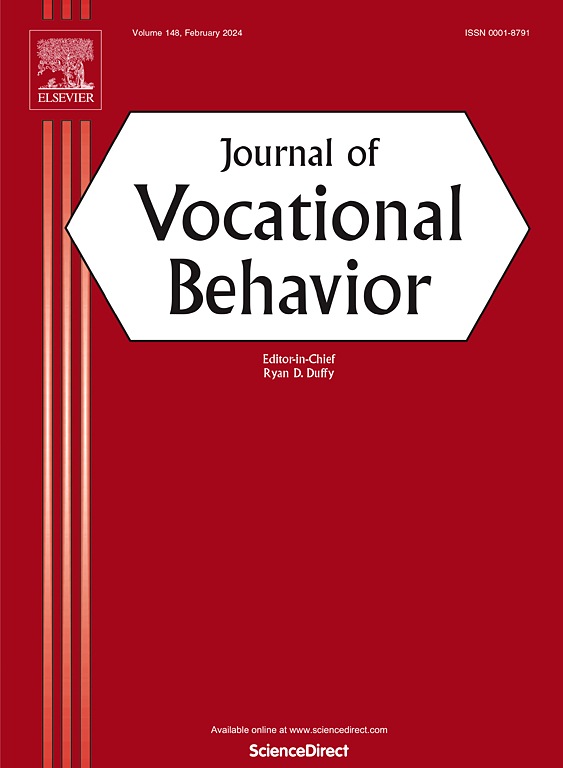Supervisor resilience promotes employee well-being: The role of resource crossover
IF 5.2
1区 心理学
Q1 PSYCHOLOGY, APPLIED
引用次数: 0
Abstract
Drawing on Conservation of Resources theory and Crossover theory, we investigated the potential for crossover of a personal resource, resilience, from supervisors to employees. Specifically, the present study examined whether supervisor resilience influences employee well-being (i.e., psychological distress, burnout, and life satisfaction) via a top-down resilience crossover process. The present study utilized a time-lagged design with three data points over a 9-month period. The sample consisted of 178 supervisors and 741 employees from the United States National Guard. Multi-level models controlling for baseline levels of the outcome variables demonstrated support for time-lagged resilience crossover from supervisor to employee. Moreover, results demonstrated support for the subsequent indirect effects on improved employee well-being outcomes including lower burnout and psychological distress, and greater life satisfaction. As such, our research contributes to our understanding of promoting employee resilience, crossover effects, and promoting employee well-being. In doing so, we integrate COR theory and Crossover theory to elucidate personal resource crossover as it pertains to supervisor and employee resilience. Additionally, we expand on understanding of how supervisor resilience can have indirect positive effects on employee well-being. Implications for theory and practice, as well as future research directions are also discussed in light of our findings.
管理者弹性促进员工幸福感:资源交叉的作用
利用资源守恒理论和跨界理论,我们研究了从管理者到员工的个人资源——弹性的跨界潜力。具体而言,本研究通过自上而下的弹性交叉过程考察了主管弹性是否影响员工的幸福感(即心理困扰、职业倦怠和生活满意度)。本研究采用时间滞后设计,三个数据点超过9个月。样本包括来自美国国民警卫队的178名主管和741名雇员。控制结果变量基线水平的多层次模型证明了从主管到员工的时间滞后弹性交叉的支持。此外,研究结果还支持了随后的间接影响,包括降低倦怠和心理困扰,以及更高的生活满意度。因此,我们的研究有助于我们理解促进员工弹性、交叉效应和促进员工幸福感。在此过程中,我们整合了COR理论和跨界理论来阐明个人资源跨界,因为它与主管和员工的弹性有关。此外,我们扩展了对管理者弹性如何对员工幸福感产生间接积极影响的理解。最后,结合研究结果,讨论了未来的研究方向和理论意义。
本文章由计算机程序翻译,如有差异,请以英文原文为准。
求助全文
约1分钟内获得全文
求助全文
来源期刊

Journal of Vocational Behavior
PSYCHOLOGY, APPLIED-
CiteScore
13.10
自引率
5.40%
发文量
85
期刊介绍:
The Journal of Vocational Behavior publishes original empirical and theoretical articles offering unique insights into the realms of career choice, career development, and work adjustment across the lifespan. These contributions are not only valuable for academic exploration but also find applications in counseling and career development programs across diverse sectors such as colleges, universities, business, industry, government, and the military.
The primary focus of the journal centers on individual decision-making regarding work and careers, prioritizing investigations into personal career choices rather than organizational or employer-level variables. Example topics encompass a broad range, from initial career choices (e.g., choice of major, initial work or organization selection, organizational attraction) to the development of a career, work transitions, work-family management, and attitudes within the workplace (such as work commitment, multiple role management, and turnover).
 求助内容:
求助内容: 应助结果提醒方式:
应助结果提醒方式:


